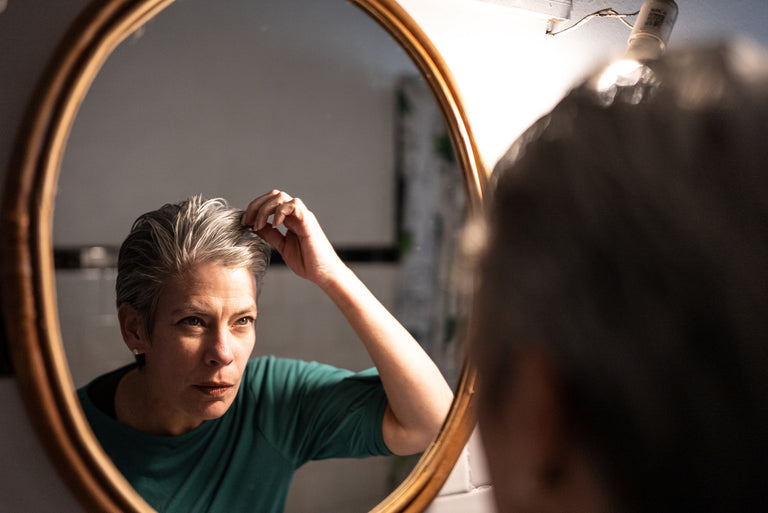
Why Does Menopause Cause Hair Loss?
MenoLabs News | Wed, Aug 02, 2023
No matter how we may try to soften the blow of hair loss — by, say, calling it a "widening part" or a "skimpier ponytail" — it smarts. And not just because our hair is often tied to our identity. Experiencing menopause hair loss, at a time when we already may be suffering from hot flashes, mood swings, brain fog, and dry, itchy skin, hardly seems fair. But perimenopause and menopause can, in fact, “potentially cause hair loss in some women,” says Sanjay Batra, PhD, a regenerative medicine, hair loss, and platelet-rich plasma expert and fellow of the American College of Cardiology.
What’s Estrogen Got to Do with It?
The female sex hormone estrogen is at the root (ahem) of the hair loss issue. Estrogen is a hair-friendly hormone — as in, it plays a big role in promoting hair growth and maintaining hair thickness. Beginning in perimenopause, however, both estrogen and progesterone (another one of our primary sex hormones) start to diminish. Interestingly, it’s not just the dip in estrogen that messes with hair growth; it’s also the resulting “unfriendly” balance of hormones we’re left with, Batra says. “Women also possess the male sex hormone testosterone, but those levels seem to stay the same before and after menopause,” he says. Suddenly, we may find our bodies responding more actively to the male sex hormones coursing through us, because there’s less of the female sex hormones to balance things out. This explains why menopausal women may start to sprout chin hairs and experience hair loss and menopause hair thinning.
Testosterone’s Effect on the Scalp
Another thing that happens when testosterone starts dominating our systems: it can convert to dihydrotestosterone, or DHT, in the scalp, Batra says. DHT is an androgen — a hormone that stimulates the development of male characteristics. It is also a sworn enemy of our hair follicles, miniaturizing them so that we not only grow less hair, but the quality of that hair also suffers (women sometimes report that their hair is suddenly dull, thin, or limp after menopause).
Is There Any Good News About Menopause Hair Loss?
It is possible for hair loss to slow down (or at least not speed up) once we reach menopause and hormone levels stabilize. Also, we often use this time of life to reassess our lifestyle habits (eating, sleeping, exercising well, etc.), which can slow the shed too, as hormones aren’t the only things to blame for hair loss. Still, some of us may continue to experience hair thinning or shedding despite all of these factors.
What to Do About Menopause Hair Loss
So, what can be done? First and foremost, consult a doctor or dermatologist for appropriate guidance and treatment options. Solutions may include supplements, topical treatments, and lifestyle changes, including everything from dietary modifications to breath work and relaxation exercises. Shavasana, anyone?
Didi Gluck is a New York City-based writer and editor who has covered beauty, health and fashion for more than 25 years. She has been the beauty and health director of Marie Claire, Shape, Real Simple, Redbook and MORE, and contributed to InStyle, Allure, Harper’s Bazaar, Elle, Travel & Leisure, Town and Country, Better Homes and Gardens, Popsugar and Southern Living.
